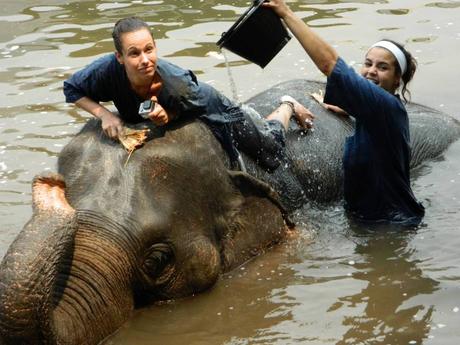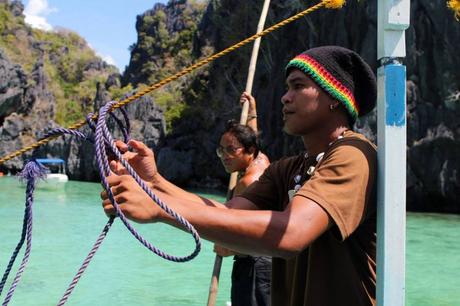Many people want to travel but prescribe to a myth that wandering is for goalless vagabonds procrastinating the responsibilities of the ‘real world.’ However, nothing could be further from the truth. there are various ways one can take part in productive long-term travel.
My mother stared at me utterly perplexed. I had just informed her of my decision to move halfway around the world and teach English in Asia.
The distance wasn’t as baffling to her as the fact that I had also declined a job offer at a top broadcast station in Chicago just after completing a grad program in journalism.
My decision didn’t make sense to her, or many others for that matter.
But it made sense to me.
What made sense was that I lived in an amazingly complex and awe-inspiring world – and I felt compelled to see and experience as much of it as I possibly could.
This aspiration of mine wasn’t a novel one. The innate desire for adventure is one echoed throughout human history.
Some of the most revered minds have preached about the glory of exploration in terms of its existential impact– Einstein, Thoreau, Emerson, Mark Twain, Jack London and Jon Muir – to name a few.
I had to follow my heart, even if that meant ignoring my mother’s tearful pleas and turning down what would have surely been an advancing position in the corporate media field.
Since that decision, I have, and continue to, travel… a lot.
My family and friends are baffled by how I manage this, but thanks to the Internet and millions of others with the same passion, there are now various accessible avenues one can use to engage in productive long-term travel.
Teach English
If you can read these words, you’re already equipped with a highly sought skill you’ve probably taken for granted your entire life – the ability to speak English.
Over the years, the demand for English teachers in foreign counties has continued to rise. The crux of this demand comes from Asia – mostly South Korea, China and Japan, which also happen to provide the best compensation and benefits.
But don’t you have to be TEFL (Teaching English as a Foreign Language) certified? Not necessarily.
Requirements differ from country to country, and sometimes even from school to school, but at the most basic level a person is able to teach English as long as they meet the following criteria:
- Have a four-year degree (any concentration)
- Never been convicted of a felony
- Can pass a health check
Besides the opportunity to live abroad and immerse yourself in a completely new culture, you also get some pretty sweet perks -complimentary flight tickets, free apartment, national healthcare, around ten paid vacation days a year, a work schedule of no more than 30 hours a week and a generous monthly paycheck.

©Tey-Marie Astudillo
Volunteer
Back in the day, finding temporary work while backpacking or traveling was limited to either word of mouth or the luck of stumbling upon something on your own. Not anymore.
The Mecca of work exchange networking, Workaway connects hosts and volunteers all over the world with a simple and effective website.
Hostels, NGOs, farms, small businesses and so on can post projects in which they are actively seeking voluntary workers in exchange for room, board and (usually) meals.
There are currently 13,629 host openings around the globe. Volunteers can access the network by signing up for $29 USD for two years. Host registration is free.

©Tey-Marie Astudillo
Reconnect With Your Primitive Side
If the idea of working on an organic coffee plantation in Colombia or picking grapes on a vineyard in Italy sounds appealing to you, then you may be harboring some WWOOF in your soul.
WWOOF (World Wide Opportunities on Organic Farm) has been around since the 1970s. The loosely organized affiliation of small farms around the globe offers meals and accommodation for hands on help in the field.
It’s over all concept is similar to Workaway, except placements are limited to farms, making it a more ideal option for those looking to interact with nature and don’t mind getting a little dirty.
Finding a WWOOF host can be a little trickier since there’s no overall connecting network. Those interested have to first check for national hosts in their country of interest, as each country has their own individual WWOOFing website.
Each national host also charges a fee to access their farm list, so you’ll want to make sure you have one or two countries in mind before you start your search.
National fees are based on country, but to give you an idea of prices, WWOOF Ecuador charges 10 USD to access their farm list while Belgium charges up to 22 Euros.


Learn Through A Local
I admit, the thought of sleeping in a stranger’s apartment in a foreign country sounds a little creepy at first. But a network of over 10 million people must be on to something.
Couchsurfing is part of what’s called hospitality exchange, where people offer their home, apartment or property to travelers looking for a place to stay free of charge.
The accommodation might be a separate room, a shared room, a couch, a floor or yard to pitch a tent.
In this arrangement, the traveler has the unique opportunity to experience local cultural immersion. Anyone who’s done any type of traveling will tell you there’s nothing like experiencing a place with the knowledge of person who’s from there. It’s also an ideal situation for learning another language.
That being said, there are safety precautions one should take. The safest way to Couchsurf is to make sure your prospective host has positive evaluations from others. You can even contact their previous guests for feedback on the website.
Other hospitality exchanges out there are:

©Tey-Marie Astudillo
Help Out A Family
An Au Pair is a foreign domestic assistant, generally a female between the ages of 20 and 30, who helps with household chores and childcare in exchange for a small salary and place to live with a host family.
While the term ‘domestic assistant’ may sound like a politically correct way to say servant, most governments restrict work hours to part-time (except for the U.S.). This grants Au Pairs availability to explore and pursue personal interests in their free time.
“I would recommend it, but caution people to know what they are getting into and also their rights,” says Mary-Sue Herron, who Au Paired in Australia for two years.
To avoid any kind of exploitation you should first familiarize yourself with Au Pair’s rights and the particular laws of the country you’re going to work in.
Some websites that help with placement are AuPairWorld, GreatAuPair, GoAuPair and AuPairCare.

©Tey-Marie Astudillo
Conclusion
A nomadic lifestyle isn’t for everyone, but for those who give it a try, it can be, and often is, an immensely rewarding experience.
Whether it’s something you do for a year or a lifetime, there’s profound personal and professional growth behind losing yourself in the extraordinary world we live in.

